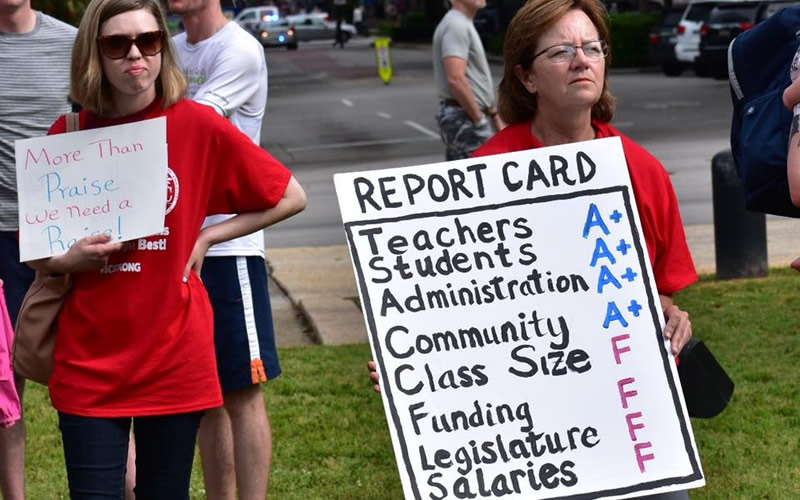
By Lindsay Street, Statehouse correspondent | It’s hard to get excited about 1 percent of anything, but education advocates are calling a 1-percent pay raise for S.C. teachers a step — albeit a small step — in the right direction.
S.C. Sen. Brad Hutto, D-Orangeburg, called South Carolina’s $8 billion spending plan passed by the legislature this week “a good education budget.”
“It’s the best we’ve had in years, but it still doesn’t get us where we need to be,” Hutto said.
With the state chronically low on every education list and districts struggling with teacher shortages, education is getting more attention and more money. This week, the annual KIDS COUNT child welfare report found 74 percent of S.C. eighth graders are not proficient in math and 71 percent of S.C. fourth graders are not proficient in reading. The state was ranked 41st in education. Other studies rank it lower.

“We don’t have our heads in the sand. We see what’s happening,” Hutto said. He cited teacher rallies across the country as they seek higher pay and the teacher shortage. “We need to do better.”
In the 2018-19 budget for K-12 education, lawmakers also added $56 million to last year’s base student cost, added $14 million toward new school buses (of which $3 million is recurring), raised base teacher pay to $32,000 from $30,113, fully funded teachers’ annual experience salary increase to 2 percent — a move typically done every year and separate from the 1 percent cost-of-living increase — annual experience salary increase, set aside $2 million for school resource officers and included $10 million in lottery funds for school safety grants.
S.C. Education Association President Bernadette Hampton said she sees a trend starting to emerge. For the second time in recent years, S.C. lawmakers have offered across-the-board raises for teachers. In 2016, it was a 2 percent raise. Now, it’s a 1 percent raise and a $60 per-pupil increase toward base-student cost — which districts can use to pay teachers more.
More money but still a shortfall
In the current 2017-18 fiscal year, the state spent $2,425 per student to fund public education, an increase of $75 per student over the previous year’s $2,350 base student cost. It’s another year in the trend of increasing this funding stream, which is still millions below state mandated levels.
At an additional $60 per student, there is still a funding shortfall of $474 per student under the state-mandated education funding formula. During the 2018-19 school year, Statehouse staffers are projecting there to be 727,513 students in public schools, which means schools statewide are $345 million short of what the law requires.

Hampton said more is needed, however. She wants to see starting teacher pay at $40,000 per year.
“We were hoping they would continue and put a plan in place to get us to there,” Hampton said. “We really wish they would be more intentional and more consistent.”
More changes in the future?
While much of the House budget debate this week was focused on state money going toward abortion-providing clinics for non-abortion procedures and medications, several legislators spoke about teacher pay, including S.C. Rep. James Smith, D-Richland. Smith is also the Democratic candidate for governor.
On the floor, he lamented more was not done for education in this year’s budget, but promised changes on the horizon.
“There will come a time when we have an agenda for public education again, and we’re doing things to recruit teachers again,” he said.
S.C. Rep. Wendell Gilliard, D-Charleston, said teachers in the state deserve a 15-percent pay increase.
“But I’d rather pass something than nothing,” he concluded. He added a quote from former President Barack Obama: “Don’t boo, vote.”
Hampton recently co-authored a letter to legislators urging them to adopt a 10-year plan to pay teachers and public employees better. She said she wants to see more consistency and commitment from the General Assembly.
Hutto said the tides have shifted and there’s commitment already among lawmakers.
“South Carolina is a growing and prospering state,” he said. “Education has got to be a priority.”
- Have a comment? Send to: feedback@statehousereport.com


